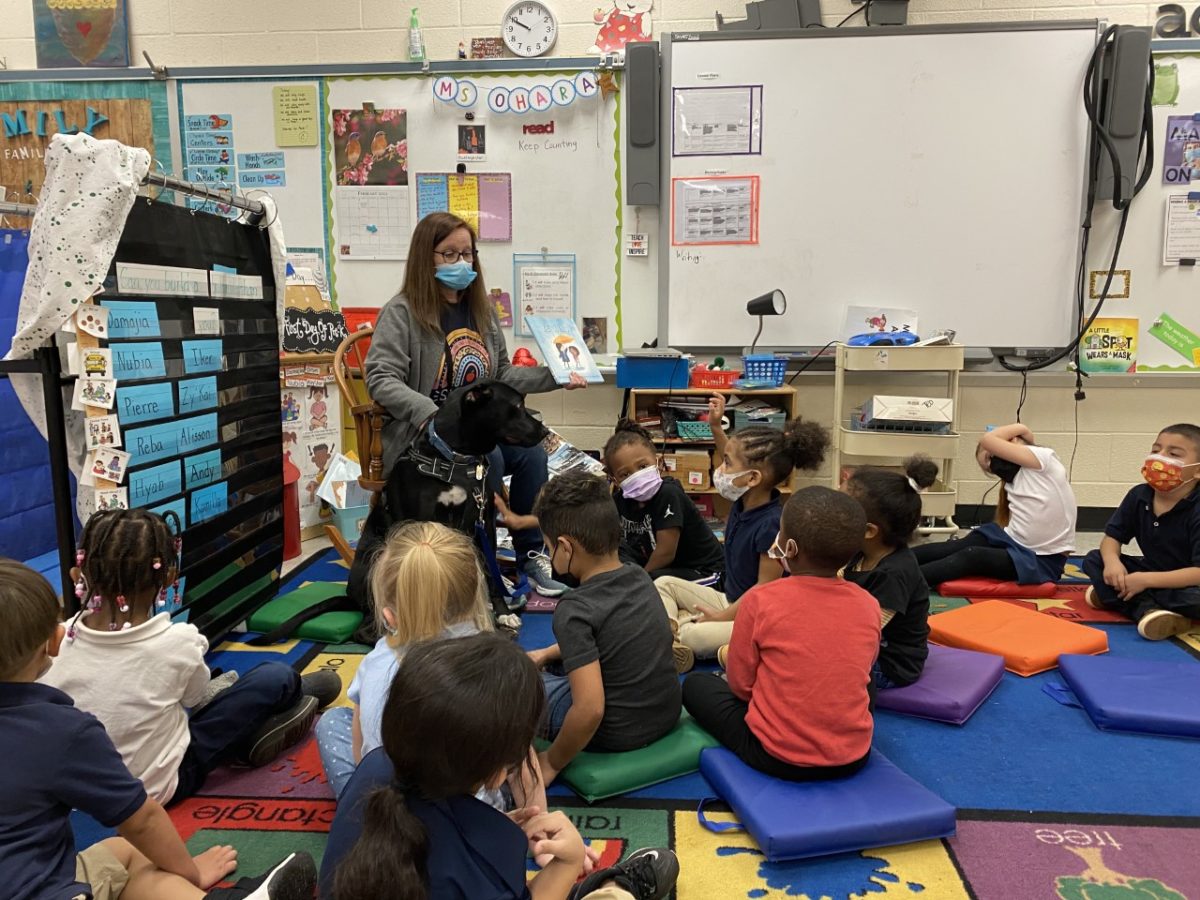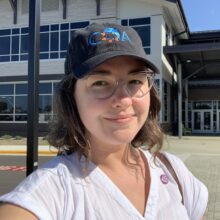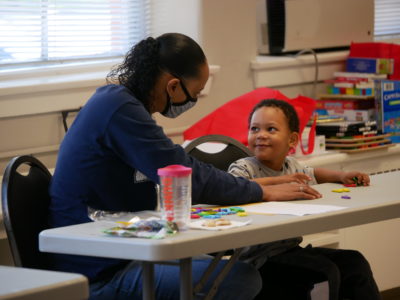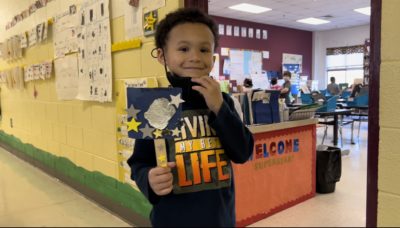

|
|
Behind the Story
In January, EdNC reported that evidence suggests at least 3,600 children in North Carolina have experienced the death of a caregiver due to COVID-19. Experts now put that estimate as high as 5,800. In February we distributed a survey to principals, school counselors, and EdWeekly newsletter subscribers asking how they and their communities support grieving children. This story highlights one example.
When Finley’s at school with her, Martina Bumgarner can hardly go a day without someone stopping by her office for kisses.
Bumgarner is in her first year as a school counselor at Merry Oaks International Academy in Charlotte. Finley is the black Lab mix who works beside her as a therapy dog — and he’s a kisser.
“Students love him, and as a new counselor that makes me so much more approachable and so much more easy to talk to,” Bumgarner said.
That level of comfort is especially important for students who are grieving the death of a caregiver. Between January 2020 and mid-November 2021, researchers estimate, between 3,600 and 5,000 children in North Carolina experienced the death of a caregiver due to COVID-19. Experts believe that number may now be as high as 5,800.
“Blessedly, I haven’t had anybody dealing with a death due to COVID,” Bumgarner said in a Zoom interview. But she does work with a student whose father died unexpectedly during the pandemic, and she has experience helping other grieving students cope with the death of a caregiver.
When Bumgarner found herself in need of resources and strategies for supporting a grieving kindergarten student, she turned to a trusted colleague who shared an online workbook called “Growing Through Grief.” This school year, Bumgarner paired the workbook with her certified therapy dog to develop a distinctive approach to counseling grieving students.
“Growing Through Grief”
Laura Oathout is known in educational settings around the world as the Music City Counselor.
A Vanderbilt-educated school counselor based in Nashville, Tennessee, she has spent the past decade creating online resources used by counselors and educators as far away as Brazil, India and Australia. This includes the “Growing Through Grief” workbook that Bumgarner uses.
“Grief is such a profoundly painful process for anyone of any age,” Oathout said in a phone interview. “I definitely saw a gap there as far as resources for young children that can be used in the grieving process.”
Oathout initially encountered that gap working as a school counselor for Metro Nashville Public Schools. She began creating her own resources, and making them available for purchase through Teachers Pay Teachers, an online marketplace for educational materials made by and for educators.
To support teachers and grieving students during the pandemic, Oathout created “Growing Through Grief.” Inspired by Elisabeth Kübler-Ross’ stages of grief, as well as solution-focused therapy and cognitive behavioral therapy, Oathout designed this resource specifically for use with young children. It can be used on paper or online, in person or virtually.
Any adult who has participated in grief counseling can easily recognize their own experiences in this resource for children.
The workbook begins by prompting students to share their name and the name of the person who died. Next is a description of grief, what the word means, how it can feel, and how it can change over time. There are opportunities to journal, an age-appropriate explanation of the stages of grief, and ways to remember the qualities of the caregiver who died. It culminates by helping students let go of painful feelings so they can continue to “grow through grief.”
“You could have a grief group of four to six students who all have the printable version that they’re working on their table, or you could have all of them on iPads or laptops and they could work through the digital version. Their progress would be saved, so that’s a really easy thing to come back to each week over multiple sessions,” Oathout said.
Bumgarner likes using the printable version, she said, because “it’s tactile — there’s writing, there’s coloring, there’s things you can hold. There’s things you will take home with you to help you remember.”
At Merry Oaks International Academy, Bumgarner supplements Oathout’s resource with the support of her professional mutt, Finley.
Dog at work
Bumgarner learned about therapy dogs after seeing a news story about Jake, a therapy dog who began working in the Iredell-Statesville School District in 2018. That inspired her to study the effect of canine-assisted interventions on children diagnosed with attention deficit hyperactivity disorder, while she pursued a master’s degree from Wake Forest University, which she completed in 2021.
That’s how she ended up with Finley by her side.
“I adopted Finley from the Humane Society of Charlotte for the purpose of training him to be a certified therapy dog,” Bumgarner explained. “My research on therapy dogs who serve children in an education setting provided no doubt that therapy dogs positively impact students. I chose him due to his size (he would not be affected much by small children stepping on his paws or tail) and his temperament.”
Finley had to pass three tests to become a certified therapy dog, and he has to be insured.
“I am very blessed that my principal is open to the therapy dog program,” Bumgarner said, “and currently in Mecklenburg County, our school is the only school that has a therapy dog on staff.”
Bumgarner was deliberate in her approach to introducing Finley to the school this year. “At the beginning, I had a video letting students know we had a therapy dog coming. ‘What is a therapy dog? How do I approach you to pet the therapy dog? How often will we see him? And why is he here?’ We had to send permission slips home for the entire school.”
Now Finley is a staple in the hallways and classrooms of Merry Oaks. “Kids can pull his tail, step on his feet, pull on his ears, and he’s just like, ‘Hi!’” Bumgarner said. “He’s a good boy.”
‘That unconditional love is really beneficial.’
Martina Bumgarner
“He has made such a huge impact at this school with students and with teachers and staff,” she said.
Bumgarner likes to have Finley in her office when she uses the “Growing through Grief” workbook, because he provides a level of comfort and support that can encourage students to open up about their feelings.
Grieving students can also “just come to my office and sit on the floor and cuddle with Finley,” she said. “Or take him out to the courtyard and just get feelings out by throwing the ball really hard, and Finley runs to go get it and bring it back. That unconditional love is really beneficial.”
She’s seen a grieving student gain confidence — crucial for children who may feel a loss of control when a caregiver has died — simply by walking Finley on his leash during an emotionally difficult day.
“Sometimes Finley’s excited on this walk,” she said, “so it gives [the student] that push and pull. ‘No, I’m in charge, Finley. You have to walk by me. You can’t smell that tree,’ or whatever. So [the student] is in charge of the dog. But also having that push and pull to get those feelings and emotions out of the body.”
For Bumgarner, properly supporting children who have experienced the death of a caregiver is a mission that hits close to home. She shared that when she was 7 years old, her grandmother died. Forty years later Bumgarner said, “I still have times when I feel sad about my grandma, and I have to just sit for a minute to work through those feelings.”
She thinks of those moments when working with grieving children.
“This is a universal experience. This is a universal feeling,” she said. “Everybody eventually loses someone close to them.”





